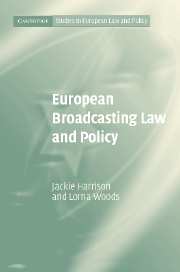Book contents
- Frontmatter
- Contents
- Series Editors' Preface
- Preface
- Case list
- PART I
- 1 Introduction
- 2 The value and functions of the broadcast media: protecting the citizen viewer
- 3 Regulation and the viewer in a changing broadcasting environment
- 4 Union competence
- 5 European broadcasting policy
- PART II
- PART III
- Appendix
- Bibliography
- Index
5 - European broadcasting policy
Published online by Cambridge University Press: 29 July 2009
- Frontmatter
- Contents
- Series Editors' Preface
- Preface
- Case list
- PART I
- 1 Introduction
- 2 The value and functions of the broadcast media: protecting the citizen viewer
- 3 Regulation and the viewer in a changing broadcasting environment
- 4 Union competence
- 5 European broadcasting policy
- PART II
- PART III
- Appendix
- Bibliography
- Index
Summary
Introduction
In chapter 1 we outlined a range of different viewing experiences divided between those of the consumer and the citizen. Our concern is that the difference between the citizen and the consumer, and their varied needs, has not been specifically addressed by either the Union institutions, or the member states in the context of broadcasting policy. Consequently, our concern is that those viewers most in need of regulatory protection are neglected by broadcasting policymakers. Unless the Union institutions make a conscious attempt to promote and protect the requirements of citizen viewers, we believe that broadcasting policy will continue to drift towards deregulation and focus on an aggregated notion of the viewer who is a consumer, both informed and active. We argue that this drift is the result of the influence of three factors we identified in chapter 1. These factors are rapid technological change, the increasingly commercialised broadcasting sector and the consequences of the Union's limited competence in the social, cultural and educational aspects of broadcasting. In this chapter we now analyse the impact of these three factors on Union broadcasting policy. We take these in a reverse order, so as to provide an analysis of the development of Union broadcasting policy historically and the issues relating to competence which have delimited the scope and scale of regulation which has emerged. The increased commercialisation of the broadcasting market and the impact of technological change are then assessed within this context.
- Type
- Chapter
- Information
- European Broadcasting Law and Policy , pp. 87 - 112Publisher: Cambridge University PressPrint publication year: 2007



